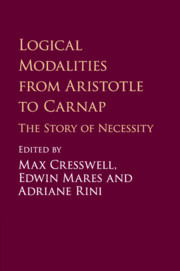Book contents
- Frontmatter
- Contents
- List of Figures and Tables
- List of Contributors
- List of Abbreviations
- Introduction
- 1 Aristotle on the Necessity of the Consequence
- 2 Aristotle on One- Sided Possibility
- 3 Why Does Aristotle Need a Modal Syllogistic?
- 4 Necessity, Possibility, and Determinism in Stoic Thought
- 5 Necessity in Avicenna and the Arabic Tradition
- 6 Modality without the Prior Analytics: Early Twelfth Century Accounts of Modal Propositions
- 7 Ockham and the Foundations of Modality in the Fourteenth Century
- 8 Theological and Scientific Applications of the Notion of Necessity in the Mediaeval and Early Modern Periods
- 9 Locke and the Problem of Necessity in Early Modern Philosophy
- 10 Leibniz's Theories of Necessity
- 11 Leibniz and the Lucky Proof
- 12 Divine Necessity and Kant's Modal Categories
- 13 Charles Sanders Peirce on Necessity
- 14 The Development of C. I. Lewis's Philosophy of Modal Logic
- 15 Carnap's Modal Predicate Logic
- Bibliography
- Index
1 - Aristotle on the Necessity of the Consequence
Published online by Cambridge University Press: 05 September 2016
- Frontmatter
- Contents
- List of Figures and Tables
- List of Contributors
- List of Abbreviations
- Introduction
- 1 Aristotle on the Necessity of the Consequence
- 2 Aristotle on One- Sided Possibility
- 3 Why Does Aristotle Need a Modal Syllogistic?
- 4 Necessity, Possibility, and Determinism in Stoic Thought
- 5 Necessity in Avicenna and the Arabic Tradition
- 6 Modality without the Prior Analytics: Early Twelfth Century Accounts of Modal Propositions
- 7 Ockham and the Foundations of Modality in the Fourteenth Century
- 8 Theological and Scientific Applications of the Notion of Necessity in the Mediaeval and Early Modern Periods
- 9 Locke and the Problem of Necessity in Early Modern Philosophy
- 10 Leibniz's Theories of Necessity
- 11 Leibniz and the Lucky Proof
- 12 Divine Necessity and Kant's Modal Categories
- 13 Charles Sanders Peirce on Necessity
- 14 The Development of C. I. Lewis's Philosophy of Modal Logic
- 15 Carnap's Modal Predicate Logic
- Bibliography
- Index
Summary
Introduction
In Prior Analytics A1, Aristotle explains what a deduction (a syllogism) is, and he makes clear that a syllogism involves ‘necessity’:
(1) A deduction is a discourse in which, certain things having been supposed, something different from the things supposed results of necessity because these things are so. (Prior Analytics A1, 24b18–22)
Aristotle's explicit description of the conclusion of a valid syllogism as ‘resulting of necessity’ makes it look as though he must have in mind a modal notion. But can we say with any certainly what Aristotle understands by the ‘necessity’ here? Scholars have of course asked this many times, but there is no consensus and a variety of interpretations have been suggested. The aim of the present paper is to focus on a source which sometimes is overlooked but which can be used to help shed light on Aristotle's understanding of the necessity in (1). This source is the examples Aristotle uses to establish where we do not have a syllogism. These examples are sometimes taken to be more trouble than help, and yet because they are Aristotle's own they are among the most direct textual evidence we have of his reasoning about his logic.
While modern philosophers and logicians might have a fairly sure idea of what today we mean by logic, we have to remember that when Aristotle was setting out the material which we know as the Prior Analytics, he was inventing logic. And though there are passages in An. Pr. where he does reflect on his invention, in setting out the syllogistic he is more focused on doing logic, less on talking about it or reflecting on the nature of his discovery. In Chapter 3 of this volume, Robin Smith investigates passages where Aristotle is reflecting on his logic, but these are special passages. For the most part reading Aristotle's discussion of the syllogistic feels like reading an introductory logic exercise book. There is in fact so little explicit reflection on the methods that some commentators have supposed that Aristotle must have proceeded simply by trial and error.
- Type
- Chapter
- Information
- Logical Modalities from Aristotle to CarnapThe Story of Necessity, pp. 11 - 28Publisher: Cambridge University PressPrint publication year: 2016



